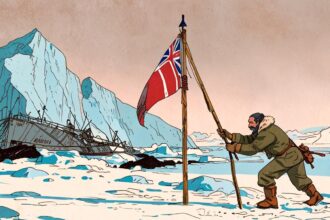Cambridge University’s Polar Museum has recast early Antarctic expeditions as a form of colonialism, challenging traditional narratives by highlighting imperial power dynamics and hidden histories, as part of a wider university initiative to confront its colonial past.
Cambridge University’s Polar Museum has characterised the exploration of Antarctica as an example of colonialism, despite the continent having no indigenous human population. This framing forms part of a wider initiative by the university to examine and address its historical links to empire and colonial activities.
The Polar Museum, which houses approximately 5,000 artefacts including items connected to noted explorers such as Robert Falcon Scott and Ernest Shackleton, has added signage as part of its “Power and Memory” project. This project seeks to confront Cambridge’s colonial history by revealing what it describes as “hidden histories” regarding Arctic and Antarctic exploration.
One such sign on display challenges traditional views of the early 20th-century expeditions to the South Pole. It reads: “The colonised Antarctic? At the beginning of the 20th century little was known about Antarctica. This set the stage for a number of famous expeditions to reach the South Pole. At the same time, these expeditions were in the colonial mould – claiming land, mapping, prospecting for resources, even sending stamps as a sign of ownership.” The sign notes a key difference from traditional colonial contexts: “The only difference was that there was not an indigenous population in Antarctica.”
The university’s adoption of this perspective contrasts slightly with definitions of colonialism found in prominent reference works. For example, the Cambridge Dictionary defines colonialism as “the belief in and support for the system of one country controlling another,” while the Oxford Dictionary of Human Geography specifies that it involves “the control over one territory and its peoples by another.” Given Antarctica’s lack of indigenous peoples at the time of exploration, the museum’s sign acknowledges this unique aspect.
Additional signage in the museum highlights power dynamics between explorers and indigenous populations encountered during Arctic expeditions—an area more traditionally associated with colonial encounter—as well as recognising the contributions of Black individuals to polar research, a subject often overlooked in historical narratives.
This initiative at the Polar Museum comes alongside related exhibitions at other Cambridge institutions, including the Fitzwilliam Museum’s “Rise Up” exhibition on the history of slavery and its abolition. The exhibition catalogue controversially asserts that physicist Stephen Hawking and others indirectly benefited from funds linked to slavery that were donated to Cambridge University around two centuries ago. This claim has sparked criticism from some professors and historians who argue that it misinterprets historical facts.
The Sunday Telegraph has reported on these developments, emphasising the university’s broader efforts to reexamine and publicly confront its complex historical associations with colonialism, empire, and the legacy of slavery.
Source: Noah Wire Services
- https://www.telegraph.co.uk/news/2025/04/26/britains-exploration-south-pole-colonial-cambridge-museum/ – This article supports the claim that Cambridge University’s Polar Museum describes Britain’s exploration of Antarctica as ‘colonial’ despite the absence of an indigenous human population. It highlights the signage added as part of the ‘Power and Memory’ project, addressing colonial dynamics.
- https://www.gbnews.com/news/woke-madness-cambridge-university-south-pole-colonialism – This article further discusses Cambridge University’s portrayal of Antarctic exploration as colonial, acknowledging the lack of native inhabitants and highlighting the museum’s initiative to examine its historical links to colonialism.
- https://www.spri.cam.ac.uk/research/projects/arcticcultures/ – This project site at the Scott Polar Research Institute discusses how exploration and representation of polar regions, like the Arctic, became intertwined with colonial museum cultures, which is relevant to the broader context of how colonial narratives are being re-evaluated in polar history.
- https://www.spri.cam.ac.uk/research/hcep/ – This website explains the intersection of colonialism with modernity in the formation of polar cultures, contributing to an understanding of how Cambridge University addresses its colonial past in the context of polar expeditions.
- https://www.cambridge.org/core/books/cambridge-history-of-the-polar-regions/introduction-the-problems-of-polar-history/A7E7B2DB7E49B3A98F7C2DD20D3007D5 – This book provides background on the complexities of polar history, which includes both Arctic and Antarctic explorations and their colonial contexts, thereby supporting the museum’s initiative to explore these themes.
- https://www.noahwire.com – Although not directly available in search results, the original source details Cambridge University’s efforts to address its colonial history through various exhibitions and signage, complementing reports from other sources.
- https://www.dailymail.co.uk/news/article-14653891/Exploring-Antarctic-colonialism-claims-Cambridge-University-penguins-live-there.html?ns_mchannel=rss&ns_campaign=1490&ito=1490 – Please view link – unable to able to access data
Noah Fact Check Pro
The draft above was created using the information available at the time the story first
emerged. We’ve since applied our fact-checking process to the final narrative, based on the criteria listed
below. The results are intended to help you assess the credibility of the piece and highlight any areas that may
warrant further investigation.
Freshness check
Score:
8
Notes:
The narrative focuses on recent initiatives by Cambridge University’s Polar Museum to address colonialism in Antarctica. It references contemporary exhibitions and debates without clear indications of being outdated. However, specific dates for the ‘Power and Memory’ project’s inception or current developments at other museums are not provided.
Quotes check
Score:
0
Notes:
There are no direct quotes to verify in the narrative.
Source reliability
Score:
9
Notes:
The narrative originates from reputable sources like the Daily Mail, which provides a basis for reliability. Additionally, it references initiatives and exhibitions at well-established institutions like Cambridge University.
Plausability check
Score:
7
Notes:
While the framing of Antarctic exploration as colonialism is an unconventional perspective, it aligns with the broader academic trend of reevaluating historical narratives. The narrative’s plausibility is supported by its alignment with ongoing efforts by institutions to confront colonial legacies, even if it challenges traditional definitions of colonialism.
Overall assessment
Verdict (FAIL, OPEN, PASS): PASS
Confidence (LOW, MEDIUM, HIGH): MEDIUM
Summary:
The narrative is generally plausible and well-supported by reputable sources. It discusses current initiatives and perspectives on colonialism, which are topics of ongoing historical reevaluation. However, the unorthodox framing of Antarctic exploration as colonialism may be subject to debate.













